
11 Results

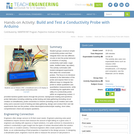
Student groups construct simple conductivity probes and then integrate them into two different circuits to test the probe behavior in solutions of varying conductivity (salt water, sugar water, distilled water, tap water). The activity culminates with student-designed experiments that utilize the constructed probes. The focus is to introduce students to the fabrication of the probe and expose them to two different ways to integrate the probe to obtain qualitative and quantitative measurements, while considering the application and utility of a conductivity probe within an engineering context. A provided handout guides teams through the process: background reading and questions; probe fabrication including soldering; probe testing and data gathering (including circuit creation on breadboard); probe connection to Arduino (including circuit creation and code entry) and a second round of testing and data gathering; design and conduct their own lab experiments that use the probes; online electrolyte/nonelectrolyte reading, short video, comprehension check and analysis questions.
- Subject:
- Career and Technical Education
- Chemistry
- Physical Science
- Material Type:
- Activity/Lab
- Provider:
- TeachEngineering
- Provider Set:
- TeachEngineering
- Author:
- Iulian Irimina
- Phillip Cook
- Date Added:
- 02/17/2017
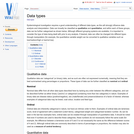
Epidemiological investigation requires a good understanding of different data types, as this will strongly influence data analysis and interpretation. Data can broadly be classified as qualitative and quantitative, and within each of these groups, data can be further categorised as shown below. Although different grouping systems are available, it is important to consider the type of data being dealt with prior to any analysis. If desired, data can often be changed into different types through manipulation (for example, the quantitative variable weight can be converted to qualitative variables such as low/medium/high or low/not low).
- Subject:
- Life Science
- Material Type:
- Diagram/Illustration
- Reading
- Provider:
- WikiVet
- Provider Set:
- Veterinary Epidemiology
- Date Added:
- 02/27/2015

Students investigate the difference between qualitative and quantitative measurements and observations. By describing objects both qualitatively and quantitatively, they learn that both types of information are required for complete descriptions. Students discuss the characteristics of many objects, demonstrating how engineers use both qualitative and quantitative information in product design.
- Subject:
- Education
- Material Type:
- Activity/Lab
- Provider:
- TeachEngineering
- Provider Set:
- TeachEngineering
- Author:
- Denise W. Carlson
- Malinda Schaefer Zarske
- Megan Schroeder
- Date Added:
- 10/14/2015
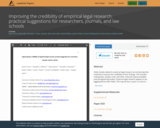
Fields closely related to empirical legal research are enhancing their methods to improve the credibility of their findings. This includes making data, analysis code, and other materials openly available, and preregistering studies. Empirical legal research appears to be lagging behind other fields. This may be due, in part, to a lack of meta-research and guidance on empirical legal studies. The authors seek to fill that gap by evaluating some indicators of credibility in empirical legal research, including a review of guidelines at legal journals. They then provide both general recommendations for researchers, and more specific recommendations aimed at three commonly used empirical legal methods: case law analysis, surveys, and qualitative studies. They end with suggestions for policies and incentive systems that may be implemented by journals and law schools.

This video lecture describes manpower planning process, various trends affecting HR demand forecasting. It also discusses quantitative and qualitative techniques of HR Demand forecasting.
- Subject:
- Arts and Humanities
- Business and Communication
- Career and Technical Education
- Management
- Material Type:
- Lecture
- Author:
- Dr. Chandrakanta Sahoo
- Date Added:
- 07/28/2021
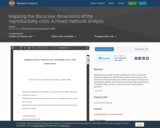
Addressing issues with the reproducibility of results is critical for scientific progress, but conflicting ideas about the sources of and solutions to irreproducibility are a barrier to change. Prior work has attempted to address this problem by creating analytical definitions of reproducibility. We take a novel empirical, mixed methods approach to understanding variation in reproducibility conversations, which yields a map of the discursive dimensions of these conversations. This analysis demonstrates that concerns about the incentive structure of science, the transparency of methods and data, and the need to reform academic publishing form the core of reproducibility discussions. We also identify three clusters of discussion that are distinct from the main group: one focused on reagents, another on statistical methods, and a final cluster focused the heterogeneity of the natural world. Although there are discursive differences between scientific and popular articles, there are no strong differences in how scientists and journalists write about the reproducibility crisis. Our findings show that conversations about reproducibility have a clear underlying structure, despite the broad scope and scale of the crisis. Our map demonstrates the value of using qualitative methods to identify the bounds and features of reproducibility discourse, and identifies distinct vocabularies and constituencies that reformers should engage with to promote change.
- Subject:
- Social Science
- Material Type:
- Reading
- Author:
- Julie Chung
- Kelsey Ichikawa
- Momin Malik
- Nicole C. Nelson
- Date Added:
- 11/13/2020
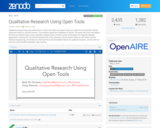
Qualitative research has long suffered from a lack of free tools for analysis, leaving no options for researchers without significant funds for software licenses. This presents significant challenges for equity. This panel discussion will explore the first two free/libre open source qualitative analysis tools out there: qcoder (R package) and Taguette (desktop application). Drawing from the diverse backgrounds of the presenters (social science, library & information science, software engineering), we will discuss what openness and extensibility means for qualitative research, and how the two tools we've built facilitate equitable, open sharing.
- Subject:
- Applied Science
- Life Science
- Physical Science
- Social Science
- Material Type:
- Lesson
- Provider:
- New York University
- Author:
- Beth M. Duckles
- Vicky Steeves
- Date Added:
- 05/07/2019
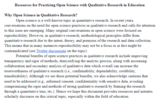
This list of resources consists of resources for researchers, editors, and reviewers interested in practicing open science principles, particularly in education research. This list is not exhaustive but meant as a starting point for individuals wanting to learn more about doing open science work specifically for qualitative research.This list was compiled by the following contributors: Rachel Renbarger, Sondra Stegenga, Thomas, Sebastian Karcher, and Crystal Steltenpohl. This resource list grew out of a hackathon at the Virtual Unconference on Open Scholarship Practices in Education Research.
- Subject:
- Education
- Political Science
- Psychology
- Social Science
- Material Type:
- Reading
- Student Guide
- Author:
- Rachel Renbarger
- Crystal Steltenpohl
- Date Added:
- 05/10/2021

This graduate seminar introduces an emerging research program within International Relations on territorial conflict. While scholars have recognized that territory has been one of the most frequent issues over which states go to war, territorial conflicts have only recently become the subject of systematic study. This course will examine why territorial conflicts arise in the first place, why some of these conflicts escalate to high levels of violence and why other territorial disputes reach settlement, thereby reducing the likelihood of war. Readings in the course draw upon political geography and history as well as qualitative and quantitative approaches to political science.
- Subject:
- Arts and Humanities
- History
- Political Science
- Social Science
- Material Type:
- Full Course
- Provider:
- MIT
- Provider Set:
- MIT OpenCourseWare
- Author:
- Fravel, M.
- Date Added:
- 09/01/2004
